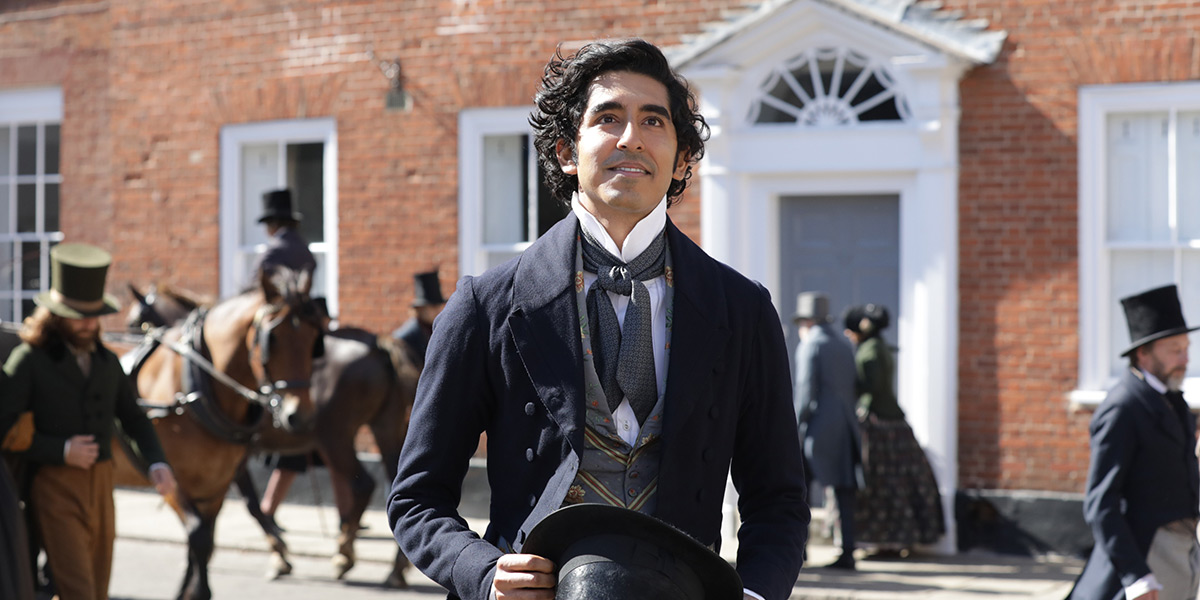David Copperfield (Dev Patel) has a story to tell. It begins with his cute, precocious little self (Jairaj Varsani) making mom laugh and nanny Mrs. Peggotty (Daisy May Cooper) laugh even harder. He’s a headstrong boy with dreams of joy thanks to the overflowing love shown to him by everyone but his aunt (Tilda Swinton’s Betsey Trotwood) … for now. Like most widowed women of thirty with an estate in the Victorian Era, however, remarrying is a foregone conclusion for Ms. Copperfield. Enter the viciously domineering Mr. Murdstone (Darren Boyd) and his sister Jane (Gwendoline Christie), an untenable atmosphere for David, and the first layover on a memorably arduous life by way of child labor in a bottling factory. It gets worse before better and then worse still.
This is Armando Iannucci’s contemporary yet period-specific adaptation of Charles Dickens’ masterpiece using the title The Personal History of David Copperfield. He and co-writer Simon Blackwell have tasked themselves with distilling that massive tome to an under two-hour romp as breezy as it is funny. While this fact makes the adventure wildly entertaining thanks to some hard lefts into farce, it also renders the whole strangely upside down as my empathy quickly shifted from David to the one character known as his prime antagonist: Mr. Heep (Ben Whishaw). As our hero rises and falls through society’s ranks, he eventually finds himself in a position to turn his nose at those stationed exactly where he was not too long ago. That he grows from the experience doesn’t, however, discount that “bag guy’s” pursuit.
That’s not to say the sniveling and duplicitous Uriah Heep is just in his methods. He works to destroy many lives on his ascent towards power, but his specific animosity towards Copperfield is warranted. It’s not enough that the mocking is done in service of impressing new rich friends (Aneurin Barnard’s Steerforth) because that lesson is learned independently of Heep’s cemented ire. And since the former’s intent is for David to remember that charity is paramount no matter how little it is he possesses to give, you must relate to the latter’s pain born from never receiving the slightest bit. We’re supposed to like the charlatan Mr. Micawber (Peter Capaldi) because his crimes don’t reach farther than his arms can stretch. That Heep’s transgressions are bigger and more of the arch-villain variety shouldn’t so readily ignore his plight.
Iannucci is picking and choosing our alignments for us with his desire for as much humor as possible. Devoid of the breadth necessary to make these characters more than comic relief, however, it becomes difficult to buy the pursuit of David’s victory above all others. Why does he deserve it more than them besides his name being in the title? There is something to the film proving a revisionist history told from his unique memories, but we never see the other side to appreciate the joke as more than a laugh at everyone else’s expense. David always gets the benefit of the doubt because he’s likable, but that’s not enough to care when Patel’s infectiously delightful performance is subverted by the character’s inherent smugness.
I eventually found myself understanding why daffy simpleton Dora Spenlow (Morfydd Clark) would fall in love with him: his bullying is gentlemanly in her mind. Agnes Wickfield (Rosalind Eleazar) on the other hand is too intelligent not to see how impressionable the object of her affection is to the dark side of humanity (although never approaching Murdstone dark). She’s ultimately the most well-rounded character involved, but her ingrained class-specific meanness also makes it hard to root for her in the long run. Besides Mrs. Peggotty and her family, no one is truly altruistic here. But where a film like Love and Friendship excels at this because it allows its characters to know they’re despicable, Iannucci wants us to believe his remain good. That incongruity threw endearment straight out the window.
If you can just check your brain at the door and not get bogged down in the dynamics being inverted through the tone, however, you should have a good time. Clark is brilliantly funny in that “I love making jokes, but can’t understand when others make the same joke back” way. Cooper is delightful as the purest soul of all and Capaldi a joy as Micawber’s circus Fagin. It’s easy to laugh at Whishaw despite the potential of feeling bad for doing so later and Swinton (with help from her Mr. Dick’s childlike innocence courtesy of Hugh Laurie) is layered to perfection as far as her hidden heart goes. Eleazar is sharp-witted to counter Clark’s dullard and Barnard has the room to really add some dramatic oomph with a depression born from being self-aware of one’s privilege if the script let him (it doesn’t).
It’s a shame because Iannucci is doing interesting things. The way he and Blackwell weave Dickens’ characters into farce is commendable and the literal colorblind casting is something to laud since the film never asks us to question its role in the plot. While Eleazar’s father being Benedict Wong and Patel’s lineage as white as can be on both sides of his parentage proves meaningless to the narrative, however, it’s undeniably important to representation in cinema. I only wish the product itself took as much care in who the characters were as it did in what they do. Hilarity simply wasn’t enough for me when the potential for real meat under that glaze was there for the taking. David Copperfield sadly never earned my desire to wish him success.
The Personal History of David Copperfield premiered at the Toronto International Film Festival.

